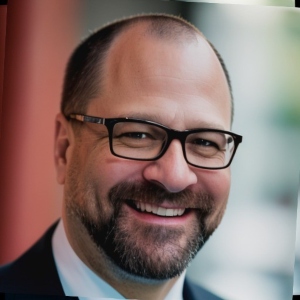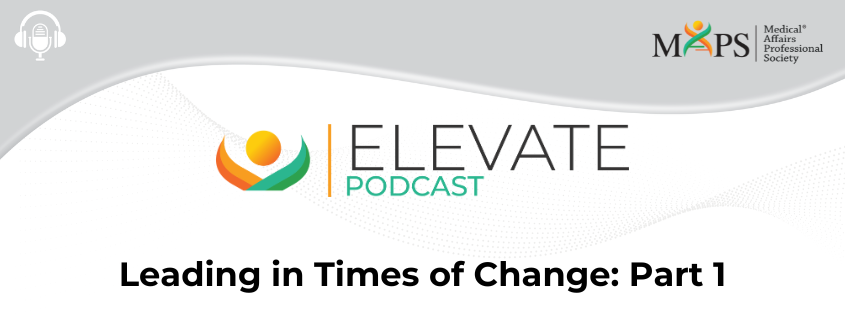In Part 1 of this 3-part series, experts from the MAPS Leadership and Management Domain discuss understanding change. How does it impact our teams, and how can our leaders guide their teams through change?
Through this episode, leaders and independent contributors may gain a better understanding of why change feels so hard right now and learn about what we can do to support each other and really thrive during these times of uncertainty.

Speaker: Stephen Kagan

Speaker: Sejal R Motwane

Speaker: Chris Turner
Following is an automated transcription provided by otter.ai. Please excuse inaccuracies.
00;00;00;00
MAPS
Welcome to this episode of the Medical Affairs Professional Society podcast “Elevate”. The views expressed in this recording are those of the individuals, and do not necessarily reflect on the opinions of MAPS or the companies with which they are affiliated. This presentation is for informational purposes only and is not intended as legal or regulatory advice. And now for today’s “Elevate” episode.
00;00;33;09
Chris Turner
Hello and welcome to our three-part podcast series on Leading During Times of Change, where we’re talking about how leaders and independent contributors can gain better understanding of why is it the change feels so hard right now, and what can we do to support each other and really, really thrive during these times of uncertainty? I’m Chris Turner and I love talking about change and org effectiveness. And I’m really, really excited about doing these series and the experts that I have the opportunity to work with today. Today’s episode is going to be all about understanding change. Why is it that it feels so intense at the moment? How does this impact our teams, and how can our leaders guide their teams through change? Using a practical three-part framework? I’m joined by two incredible guests today, Stephen Kagan and Sejal Motwane, who bring really deep experience and insight into this conversation. Stephen, Sejal, welcome and thank you for being here. Steve, I’d like to start with you. Can you tell our listeners a little bit about your background and really what inspired you to be the champion for this podcast series?
00;01;37;14
Stephen Kagan
Again. Thanks, Chris. And I have spent about over 30 years in health care, with half of my career as an infectious disease physician and then nearly 18 years at a large pharma company in multiple Medical Affairs roles and leadership positions. Most recently, I was the Professional Development Lead for the Global Medical Affairs Organization. Over these years, I’ve seen Medical Affairs evolve from what was a critical support function to what is now a key strategic pillar. What inspired me to champion this podcast is the sheer pace of change we’re seeing now. Digital transformation, AI integration, shifting regulatory landscapes. Medical professionals are being asked to do more, as you know, often with a lot less. They’re asked to do it faster and with greater precision. Organizational structures are continuously changing to meet these needs. I wanted to create a space where we could talk about how to better lead through all of that.
00;02;42;19
Chris Turner
Thanks, Steve. And Sejal, can you share a little bit about your role and what are you seeing in the field and with your teams?
00;02;50;03
Sejal R Motwane
Chris, thanks so much for having me here today. I lead Skills and Leadership Development for Global Medical Affairs at a large pharma company. Taking a step back, my professional journey began as a clinical pharmacist before transitioning into pharma, where I called a variety of roles within Medical Affairs. Throughout my professional journey, one constant has been my deep respect for learning and the power of knowledge. And also a passion for sharing experiences that help others grow. In my current role, I focus on helping field medical teams stay agile, stay informed, and really be ready to lead. What I’m seeing now is a meaningful shift in how we train and support our teams. There’s a growing emphasis on resilience, adaptability, and certainly cross-functional collaboration. We’re not just teaching the science anymore. We’re helping people navigate uncertainty and change with confidence and clarity.
00;03;45;19
Chris Turner
Thank you for that. And Steve, over 30 years, I’m sure you’ve seen the industry change quite a bit in both practice and then in industry role. But why is it different now? Why does change feel so relentless and especially for the Medical Affairs community?
00;04;00;24
Stephen Kagan
Chris, I think it’s about the pace. The pace of change in our industry is unlike anything I have ever seen. We’re dealing with AI driven decision making, real world evidence, understanding digital, engaging in new digital platforms. And we’re having to do all of these at once. You add that to the pressure from regulatory bodies and pricing reform, and it’s no wonder people feel overwhelmed. Medical Affairs professionals are expected also to be strategic. They’re expected to continue as they should to be scientific, agile, tech savvy, and they often don’t have the time to fully adapt to all of this. It’s not just the volume of the change, it’s the velocity.
00;04;44;15
Chris Turner
Sejal, when you think about that velocity and the impact across the Medical Affairs community, what role do the managers and directors and your organization and other leaders, what role do they play in helping the teams navigate this change?
00;04;58;05
Sejal Motwane
Absolutely, Chris. Leaders play a critical role on how teams experience change. It’s not enough to communicate the what. We have to explain the why and create space for people to process. I encourage using a model that emphasizes psychological safety and structured pauses. We need to tailor our messaging based on personality types and behavioral preferences as well. We need to understand that some colleagues need data. Others may need reassurance. Leaders need to be emotionally intelligent and strategically agile.
00;05;30;29
Chris Turner
So if we keep talking more about that human side and the impact, what are you seeing in terms of how these rapid change, how is it affecting team dynamics? How is it affecting team and individual performance? What are you seeing?
00;05;46;03
Sejal Motwane
It’s a great question. And I think we’re seeing across the board burnout, some disengagement and performance dips, especially when change is constant and poorly communicated and managed. Training gaps widen and people are losing confidence. That’s why investment in continuous learning and feedback loops is critical to stay current during change. Organizations must integrate resilience training into onboarding and leadership development programs. What do you think, Steve?
00;06;17;06
Stephen Kagan
Yeah, I have to agree, Sejal. I’ve seen teams thrive when leaders are transparent and empathetic. One of the biggest mistakes is rushing through change without acknowledging the emotional toll. When we launched a major digital initiative, for example, we built in time for reflection and time for feedback and time for questions. That neutral space made all the difference. People need to feel heard before they can move forward.
00;06;46;06
Chris Turner
That’s a that’s a great cue up, Steve, for a model that I know that we’ve been talking about for a while between us. A really simple, powerful three step approach to help leaders take their teams through these change processes. So the three parts are honoring the past, celebrating the present, and embracing the future. And unlike other models that are not really great fits, like the grief model, which we’ve probably all seen applied to these sort of things, it isn’t about emotional stages. It’s really about how do I create a conversation and how do leaders use this tool as a conversational tool for their teams. Honoring the past in this case means acknowledging what’s worked in the past. What have we done to get here? What have we built, and what’s our legacy? Ignoring that means that we’re telling our people that what happened before really didn’t matter. So stopping and honoring the past is critical. Celebrating where we are now is the same sort of idea as what are our current strengths? What are our recent wins, and who are the people around us who are making things, and making an impact? Right now? And only after we focus on those two things can we then say, let’s embrace the future. How do we then look forward with optimism and clarity? And Steve, as you said, there’s a lot about that neutral space and pausing and creating space for reflection. Between each of these steps, leaders have to create a pause, what we call a neutral space, so that the team members can really mentally shift and do those reflections. And this helps reduce resistance and builds trust with, with the leader. So we’ll explore more about this model in the future episodes. But today we wanted to introduce it as a mindset for leaders. I want to go back to the both of you for, for another final thought, if you will. But if you were to think about one thing that leaders in Medical Affairs must do to change this competency, what is it that you would want them to increase and add as a core skill set?
00;08;37;26
Stephen Kagan
So. So, Chris, I think it starts really with humility along with curiosity and authenticity and that need to build trust. Leaders must recognize that change isn’t just a one-time event, it’s a constant. Building change competence means staying informed, listening to your teams, being willing to adapt your leadership style depending on the moment and the person. I really appreciate what Sejal said earlier about psychological safety. Without it, change just doesn’t stick. Most importantly, we must remember that as leaders, we’re here to serve our colleagues.
00;09;18;12
Sejal R Motwane
I completely agree, Steve. And to build on that, I’d like to further emphasize that leaders need to invest in their own emotional intelligence. Change competence isn’t just about strategy. It’s about empathy, communication, and timing. And when leaders model resilience and openness, their teams naturally follow. I also want to stop for just a moment and recognize your insight about leaders having humility. It’s really critical in today’s environment.
00;09;47;08
Chris Turner
Steve and Sejal, thank you for joining me. Thank you for sharing your thoughts and your leadership in this space. Listeners, in our next episode, we will dive deeper into resilience and what it really means in the context of field medical teams, how leaders can foster it in themselves and others and use it to help people through the change. We’ll share a resilience model that’s practical, grounded in science, and we’ll continue the conversation with Steve and Sejal. Until then, I urge you to take a moment to reflect. What part of your past do you want to honor with your team? What’s worth celebrating today, and then how can you help your team embrace what’s coming next? Thank you for listening and stay tuned for part two.



